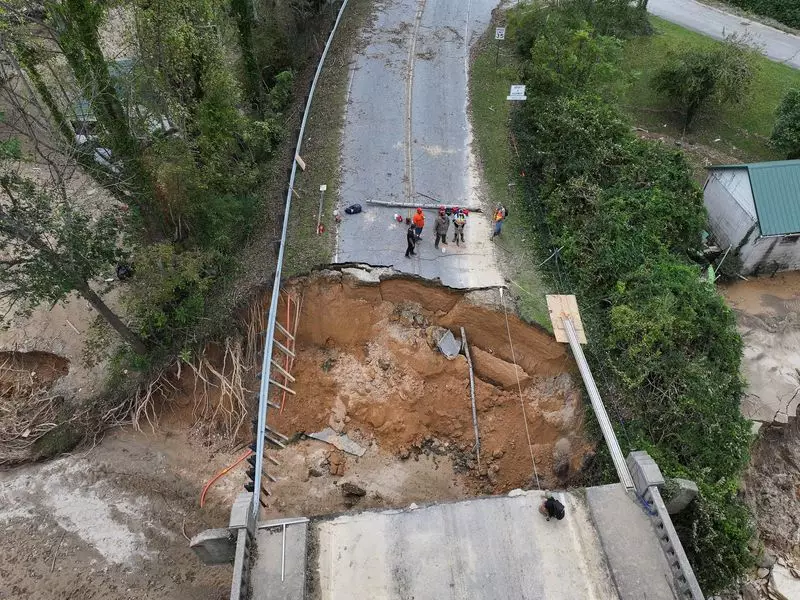In a stunning demonstration of nature’s fury, Tropical Storm Helene wreaked havoc on the southeastern United States, particularly affecting the mountainous regions of North Carolina. The storm unveiled itself as not merely a weather event but a catastrophic phenomenon leading to widespread destruction, leaving countless citizens grappling with loss and uncertainty. Airlifting emergency supplies and coordinating rescue efforts has become a pressing priority for both local officials and federal authorities.
As teams scrambled to deliver food and water to isolated towns, the reality of the damage inflicted on communities became starkly apparent. Towns like Bat Cave, a small hamlet located approximately 100 miles from Charlotte, faced unprecedented flooding that transformed the landscape into what many described as “post-apocalyptic.” According to climate scientists, the intensity of the rainfall and subsequent flooding has been deemed a “1,000-year event.” Roads became unrecognizable, swept away by torrents, and vital infrastructure was rendered useless as the Broad River overflowed its banks.
Witness accounts emerge bearing testimony to the sheer force of nature. For instance, local resident Aaron Smith recounted how his family narrowly escaped disaster, grappling with the loss of not just their home but their sense of stability. “There’s no roads, there’s no evidence of roads, there’s no trees, it’s just water and stuff,” he lamented. The destruction left behind highlights a critical need for both immediate relief and long-term recovery strategies.
The death toll from Tropical Storm Helene currently exceeds 100 across several states, comprising North and South Carolina, Georgia, Florida, Virginia, and Tennessee. As search and rescue teams move into isolated areas, officials predict that this number may increase, revealing the grim reality faced by affected families. In North Carolina alone, fatalities have been reported at alarming rates, particularly in areas such as Buncombe County, which sees a notable number of fatalities linked to the storm’s aftermath.
The psychological impact of the storm cannot be overlooked. Individuals are left not only to face material loss but the emotional toll of uncertainty regarding the fate of loved ones. President Joe Biden’s remarks on the anguish surrounding missing family members resonate deeply with those affected: “There’s nothing like wondering, ‘is my husband, wife, son, daughter, mother, father alive?’”
With much of the region lacking basic necessities like water, electricity, and reliable communication, the federal and local governments have launched a massive recovery operation. Reports indicate that over 7,000 individuals have registered for assistance from the Federal Emergency Management Agency (FEMA), and about 1.8 million homes and businesses remain without power days after the storm’s passage. The National Guard has played a crucial role in providing aid, airlifting significant quantities of supplies into hard-hit areas.
Local leaders and government officials, grappling with a crisis of this magnitude, have referred to the scene as overwhelming. Charlotte City Councilman Tariq Bokhari shared poignant images from the beleaguered Lake Lure area, encapsulating the scope of the disaster. The images, laden with debris and wreckage, reflect not just physical destruction but emotional weariness, compounding the recovery challenge.
Confronting Climate Change
In the wake of such devastation, discussions around climate change have resurfaced as critical components in the discourse of future prevention and response. President Biden’s plan to visit the affected areas not only signifies government acknowledgment of the crisis but emphasizes the need for increased federal support and reflection on future resilience strategies. Climate experts assert that events like the one caused by Helene may become increasingly common, pushing communities to reconsider their infrastructure and disaster preparedness.
Biden has hinted at seeking supplemental funding from Congress to bolster recovery efforts, aiming to ensure that affected families receive necessary resources to rebuild their lives. In tandem, there is a burgeoning need for a broader conversation about climate policy, urging societies to take actionable measures against the realities of climate change.
The catastrophic impact of Tropical Storm Helene has unveiled critical vulnerabilities in numerous communities throughout the southeastern United States. While immediate response efforts focus on relief and recovery, the broader implications of climate change remain a pressing concern that must be addressed. As communities like Bat Cave mend from horrific losses, they will not only need material support but also comprehensive planning to ensure resilience against future natural disasters. This tragedy stands as a reminder that the scars left by such events linger long after the storm has passed, urging a concerted effort for reform in how society tackles environmental challenges moving forward.

